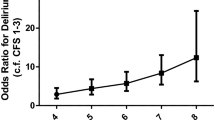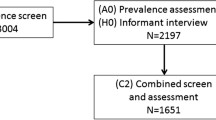Abstract
OBJECTIVES: To describe the clinical course and outcomes of delirium up to 12 months after diagnosis, the relationship between the in-hospital clinical course and post-discharge outcomes, and the role of dementia in both the clinical course and outcomes of delirium.
DESIGN: Prospective cohort study.
SETTING: Medical wards of a 400-bed, university-affiliated, primary acute care hospital in Montreal.
PATIENTS: Cohort of 193 medical inpatients aged 65 and over with delirium diagnosed at admission or during the first week in hospital, who were discharged alive from hospital.
MEASUREMENTS AND MAIN RESULTS: Study outcomes included cognitive impairment and activities of daily living (standardized, face-to-face clinical instruments at 1-, 2-, 6-, and 12-month follow-up), and mortality. Dementia, severity of illness, comorbidity, and sociodemographic variables were measured at time of diagnosis. Several measures of the inhospital course of delirium were constructed. The mean numbers of symptoms of delirium at diagnosis and 12-month follow-up, respectively, were 4.5 and 3.5 in the subgroup of patients with dementia and 3.4 and 2.2 among those without dementia. Inattention, disorientation, and impaired memory were the most persistent symptoms in both subgroups. In multivariate analyses, pre-morbid and admission level of function, nursing home residence, and slower recovery during the initial hospitalization were associated with worse cognitive and functional outcomes but not mortality.
CONCLUSIONS: Among patients with and without dementia, symptoms of delirium persist up to 12 months after diagnosis. Quicker in-hospital recovery is associated with better outcomes.
Similar content being viewed by others
References
Rockwood K. The occurrence and duration of symptoms in elderly patients with delirium. J Gerontol. 1993;48:M162–6.
Rudberg MA, Pompei P, Foreman MD, Ross RE, Cassel CK. The natural history of delirium in older hospitalized patients: a syndrome of heterogeneity. Age Ageing. 1997;26:169–74.
O’Keeffe S, Lavan J. The prognostic significance of delirium in older hospital patients. J Am Geriatr Soc. 1997;45:174–8.
Levkoff SE, Evans DA, Liptzin B, et al. Delirium: the occurrence and persistence of symptoms among elderly hospitalized patients. Arch Intern Med. 1992;152:334–40.
McCusker J, Cole M, Abrahamowicz M, Primeau F, Belzile E. Delirium predicts 12-month mortality. Arch Intern Med. 2002;162:457–63.
McCusker J, Cole M, Dendukuri N, Belzile E. Delirium in older medical inpatients: marker for subsequent cognitive and functional status. A prospective study. Can Med Assoc J. 2001;165:575–83.
Cole M, McCusker J, Bellavance F, et al. Systematic detection and multidisciplinary care of delirium in older medical inpatients: a randomized trial. Can Med Assoc J. 2002;167:753–9.
Pfeiffer E. A short portable mentals status questionnaire for the assessment of organic brain deficit in elderly patients. J Am Geriatr Soc. 1975;23:433–41.
Inouye SK, VanDyck CH, Alessi CA, Balkin S, Siegal AP, Horwitz RJ. Clarifying confusion: the confusion assessment method, a new method for detection of delirium. Ann Intern Med. 1990;113:941–8.
Lewis LM, Miller DK, Morley JE, Nork MJ, Lasater LC. Unrecognized delirium in ED geriatric patients. Am J Emerg Med. 1995;13:142–5.
Mahoney FI, Barthel DW. Functional evaluation: the Barthel Index. Md State Med J. 1995;14:61–5.
Shah S, Vanclay F, Cooper B. Improving the sensitivity of the Barthel Index for stroke rehabilitation. J Clin Epidemiol. 1989;42:703–9.
Folstein MF, Folstein SE, McHugh PR. “Mini-mental state”: a practical method for grading the cognitive state of patients for the clinician. J Psychiatr Res. 1975;12:189–98.
Tombaugh TN, McIntyre NJ. The Mini-Mental State Examination: a comprehensive review. J Am Geriatr Soc. 1992;40:922–35.
Fillenbaum G. Multidimensional Functional Assessment: The OARS Methodology—A Manual, 2nd ed. Durham, NC: Center for the Study of Aging and Human Development, Duke University; 1978.
McCusker J, Cole M, Bellavance F, Primeau F. Reliability and validity of a new measure of severity of delirium. Int Psychogeriatr. 1998;10:421–33.
Jorm AF. A short form of the Informant Questionnaire on Cognitive Decline in the Elderly (IQCODE): development and crossvalidation. Psychol Med. 1994;24:145–53.
Jorm AF, Broe GA, Creasey H, et al. Further data on the validity of the informant questionnaire on cognitive decline in the elderly (IQCODE). Int J Geriatr Psychiatry. 1996;11:131–9.
Jorm A, Christensen H, Henderson A, Jacomb PA, Korten A, Mackinnon A. Informant ratings of cognitive decline of elderly people: relationship to longitudinal change on cognitive tests. Age Ageing. 1996;25:125–9.
Law S, Wolfson C. Validation of a French version of an informant-based questionnaire as a screening test for Alzheimer’s disease. Br J Psychiatry. 1995;167:541–44.
Charlson M, Sax F, MacKenzie R, Fields S, Braham R, Douglas R. Assessing illness severity: does clinical judgment work? J Chronic Dis. 1986;39:439–52.
Inouye SK, Viscoli CM, Horwitz RI, Hurst LD, Tinetti ME. A predictive model for delirium in hospitalized elderly medical patients based on admission characteristics. Ann Intern Med. 1993;119:474–81.
Charlson M, Pompei P, Ales K, MacKenzie R. A new method of classifying prognostic comorbidity in longitudinal studies: development and validation. J Chronic Dis. 1987;40:373–83.
Knaus W, Draper E, Wagner D, Zimmerman J. APACHE II: a severity of disease classification system. Crit Care Med. 1985;13:818–29.
Grambsch P, Therneau T. Proportional hazards tests and diagnostics based on weighted residuals. Biometrika. 1994;81:515–26.
Neter J, Kutner MH, Nachtsheim CJ, Wasserman W. Applied Linear Statistical Models, 4th ed. New York, NY: McGraw-Hill; 1996.
Levkoff SE, Liptzin B, Evans DA, et al. Progression and resolution of delirium in elderly patients hospitalized for acute care. Am J Geriatr Psychiatry. 1994;2:230–8.
Author information
Authors and Affiliations
Corresponding author
Additional information
This research was supported by grants from the Medical Research Council of Canada (MA14709), the Fonds de la Recherche en Santé du Québec (980892), the National Health Research Development Program (6605-4686-403), and St. Mary’ Hospital Center (96-27).
Rights and permissions
About this article
Cite this article
McCusker, J., Cole, M., Dendukuri, N. et al. The course of delirium in older medical inpatients. J GEN INTERN MED 18, 696–704 (2003). https://doi.org/10.1046/j.1525-1497.2003.20602.x
Issue Date:
DOI: https://doi.org/10.1046/j.1525-1497.2003.20602.x




